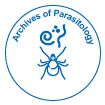Diagnosis Serological of Toxoplasmosis using Recombinants Antigens
Received Date: Feb 23, 2018 / Accepted Date: Apr 04, 2018 / Published Date: Apr 10, 2018
Abstract
Toxoplasma gondii, the causative agent of the toxoplasmosis is an obligate intracellular parasite that affects humans, domestic and wild animals. The transmission of this parasitosis can occur by consuming contaminated food, by the accidental ingestion of oocysts in the environment or by transfer of the pathogen from the mother to the fetus. The life cycle presents three morphological stages: 1) tachyzoite, infectious form that quickly multiply in any cell of the intermediate host and non-intestinal epithelial cells of the definitive host; 2) bradyzoite, located in the tissue cysts of intermediate host and 3) sporozoite stage present in the environment. Serodiagnosis is critical in two risk groups: 1) patients with deficiencies in their immune system (immunocompromised) which due to its delicate state of health are very fragile and can die by the complications originated by toxoplasmosis, 2) pregnant women, in which can ocurr transmission of the parasite to the fetus and subsequently cause an abortion or severe neonatal malformations. The serodiagnosis of the congenital disease presents serious drawbacks, due to the absence of anti- T. gondii IgM antibodies in a large proportion of infected children. Native antigens obtained from extracts of the parasite (Toxoplasma lysate antigen (TLA)) generally have little specificity, because they are a complex mixture that causes cross-reactions. Advances in Molecular Biology have allowed to optimize the diagnosis through the obtaining of recombinant antigens (RA), which are a very useful tool, with many advantages: high sensitivity and specificity, production in large quantities at relatively low cost, their handling is safe for the researcher, can be purified to homogeneity through the use of affinity tags that allows its easy and rapid purification in few steps, are among the many benefits that such proteins exhibit for providing a safe and optimal diagnostic. Another biotechnological advance very used is the synthesis of the chimeras, designed through the fusion of several RA with excellent properties. The combination of immunoreactive epitopes from proteins of different stages of the life cycle of T. gondii is a spectacular strategy to overcoming the of antigenic complexity of the parasite, which allows the production of a much more immunodominant protein than the use of proteins separately and the obtaining of promising results for the acquisition of the ideal antigens to detect toxoplasmosis. In order to discriminate between persons in the acute and chronic phase of infection have been developed tests of avidity of IgG, very relevant in the case of pregnant women, which enable to administer chemotherapy in a timely and effective manner and, therefore, protect the fetus from the irreversible damage caused by the parasite. This review analyzes the different routes followed by the serodiagnosis in the course of many years, from its beginning to the present, with its difficulties and its great progress, seeking to achieve excellence in the detection of antibodies against T. gondii through the use of the recombinant DNA technology, with the aim of improving the living conditions of the people who suffer from this disease, which is of fundamental importance because of the large number of cases that are scattered all over the world.
Keywords: T. gondii, serodiagnosis, recombinants antigens, Toxoplasma IgG avidity assay, ELISA
Citation: Márquez-Contreras ME (2018) Diagnosis Serological of Toxoplasmosis using Recombinants Antigens. Arch Parasitol 2: 116.
Copyright: © 2018 Márquez-Contreras ME. This is an open-access article distributed under the terms of the Creative Commons Attribution License, which permits unrestricted use, distribution, and reproduction in any medium, provided the original author and source are credited.
Share This Article
Open Access Journals
Article Usage
- Total views: 3489
- [From(publication date): 0-2018 - Apr 28, 2025]
- Breakdown by view type
- HTML page views: 2651
- PDF downloads: 838
